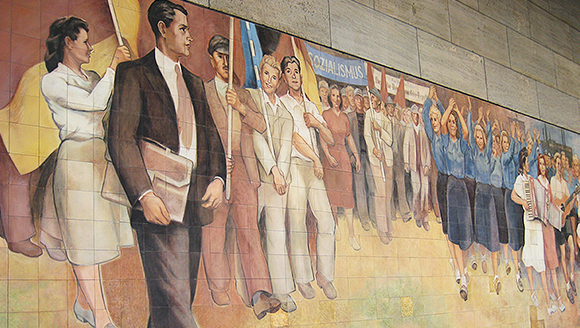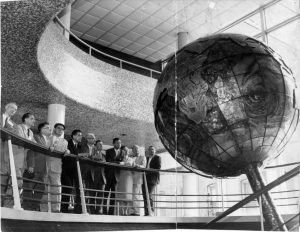Sam Evans, a PhD researcher at the Department for Organizational Psychology, is leading a series of focus groups which will ask participants to reveal what it takes to get in and get on in the museum sector, and how social class shapes career chances and experiences.

I’m interested in how inequality is reinforced in the workplace. Class, until recently, has been surprisingly absent from the debate. Research into diversity or equality, often overlooks class, as does occupational psychology in general. Part of the reason for this absence is that class is not a legally protected characteristic, like age or gender, but also it is argued that there has been a more fundamental ‘individualisation’ of Western culture.
Class identities have become more difficult to see or express in the workplace. Our careers are thus seen as our responsibility, and we don’t often think or talk about the structural inequalities that might frame this. However, there is research suggesting inequality at work is increasing, professions are becoming more not less exclusive, and social mobility is declining.
I want to explore these issues in-depth in my research project, The Museum of Them and Us; I am interested not just in how people are classed, but also occupations, roles and organisations. I am particularly interested in why some careers and types of work favour some groups of people and not others. We assume anyone can get in and get on, no matter how tough, given they have the right personal qualities. But what is this really like for people from different backgrounds? I have chosen to look at museums, partly because I am familiar with the field, but also because visiting and working in museums is described as middle class. But why is this, does this account for all types of work, and what does this mean for people who might not be from middle-class backgrounds.
I don’t have a fixed definition of the term ‘class’ (this is a subject that has been debated for 150 years and most researchers recognise there is no one single definition), but am using Pierre Bourdieu’s concept of capital of class. This involves looking at the types of economic, social or cultural capital that are valued within different types of museum work and how this relates to the type of capital people actually have, or are able to acquire. Cultural capital is particularly important as this relates to accent, dress, education and knowledge of particular types of culture, and is often highly valued in cultural work.
I have already conducted interviews with representative bodies, trade unions and membership bodies as well as analysing reports and websites to look at how ‘getting and getting on is described’. I have found that, as with other research, museum work has become less secure and more competitive. The onus seems to be on the person to develop themselves as specialist and professional, and yet also flexible and versatile. This potentially makes it riskier and less beneficial for anyone entering the field. Class was talked about but was often described as difficult to see or measure, and most diversity initiatives were aimed at developing the individual to fit the required ways of working, rather than look more closely at how ways of working might be creating inequalities.
With the focus groups and interviews, on the one hand, I am asking people to talk about their work – what it takes to get in and on, how this might have changed, how this might be different for different roles, are some roles held in higher esteem than others and why. On the other hand, I want to talk about social class – what does it mean to people, do they think class matters and if so, how? I am also asking people to contribute images or photos that they think represent their work.
Take part in the focus groups:
If you have worked or volunteered for a museum you can take part in a focus group or an interview. If people think that class has mattered to them in particular, I am also conducting private interviews.
Taking part is confidential, enjoyable and you will be helping the sector. To take part in a focus group or an interview and for further information, please contact me or visit my website.
Thursday 5 April
6PM – 7.30PM, Birkbeck Main Building, Room MAL 420, Malet Street, WC1E 7HZ
Wednesday 11 April
6.30PM – 8PM, Birkbeck Main Building, Room MAL 420, Malet Street, WC1E 7HZ.
Thursday 26 April
6PM – 7.30PM, Museums Association Offices, 42 Clerkenwell Close, London, EC1R 0AZ
Friday 18 May
2.30PM – 4PM, Birmingham Museum and Art Gallery, Chamberlain Square, Birmingham B3 3DH
Wednesday 23 May
6PM – 7.30PM, Museums Association Offices, 42 Clerkenwell Close, London, EC1R 0AZ
Thursday 7 June
4PM – 5.30PM, Whitworth Gallery, The University of Manchester, Oxford Road, Manchester, M15 6ER
Thursday 14 June
5.30PM – 7PM, M Shed, Princes Wharf, Wapping Road, Bristol, BS1 4RN
Or schedule an interview:
If you think social class has mattered to you personally in your work or career then you can take in part in an individual interview, by email, Skype or face to face (depending on your location).
If you are interested in finding out more, please contact Sam directly.
About Sam:
I studied History originally, and then spent about 25 years working in marketing in the museum, cultural and public sectors. A lot of my work was really about understanding people and organisational cultures as much as ‘doing’ marketing, hence my interest in studying organisational psychology. I started studying part time about 8 years ago, first obtaining a degree in psychology at OU, then moving on to the MSc in Organisational Psychology at Birkbeck.
About the same time as graduating, I was made redundant, which forced a decision – stick to the marketing “battleship” I knew, or jump onto the less stable “raft” of psychology. I had already met some PhD students and Dr Rebecca Whiting who became my supervisor, and thought I would really like to study for a PhD here. So when I was offered a studentship, I took the leap. It’s been one of the best decisions I’ve ever made!
From Dr Rebecca Whiting, a lecturer in the Department of Organisational Psychology and Sam’s PhD supervisor:
Sam brings a wealth of experience to her research from working in this sector and an intellectual rigour from her academic training. Class is a challenging concept to research because of the many and sometimes conflicting ways in which its conceptualised and measured.
Many definitions reflect the relationship between class and socio-economic and cultural status. However, since class is not a ‘protected characteristic’ under the Equality Act 2010, it doesn’t always appear as an aspect of diversity in organizations, so is ripe for critical investigation. Museums are key locations of our socio-cultural heritage but are an under-researched context in organizational and occupational research.
This highlights the importance of Sam’s research which brings together this topic and context to explore how class impacts on museum work.



